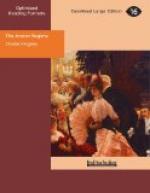“The bailiff’s daughter
dear
That dwelt at Islington,”
without tarnishing, as he would have done on the Continent, the scutcheon of his ancestors. That which has saved England from a central despotism, such as crushed, during the eighteenth century, every nation on the Continent, is the very same peculiarity which makes the advent of the masses to a share in political power safe and harmless; namely, the absence of caste, or rather (for there is sure to be a moral fact underlying and causing every political fact) the absence of that wicked pride which perpetuates caste; forbidding those to intermarry whom nature and fact pronounce to be fit mates before God and man.
These views are not mine only. They have been already set forth so much more forcibly by M. de Tocqueville, that I should have thought it unnecessary to talk about them, were not the rhetorical phrases, “Caste,” “Privileged Classes,” “Aristocratic Exclusiveness,” and such-like, bandied about again just now, as if they represented facts. If there remain in this kingdom any facts which correspond to those words, let them be abolished as speedily as possible: but that such do remain was not the opinion of the master of modern political philosophy, M. de Tocqueville.
He expresses his surprise “that the fact which distinguishes England from all other modern nations, and which alone can throw light on her peculiarities, . . . has not attracted more attention, . . . and that habit has rendered it, as it were, imperceptible to the English themselves—that England was the only country in which the system of caste had been not only modified, but effectually destroyed. The nobility and the middle classes followed the same business, embraced the same professions, and, what is far more significant, intermarried with each other. The daughter of the greatest nobleman” (and this, if true of the eighteenth century, has become far more true of the nineteenth) “could already, without disgrace, marry a man of yesterday.” . . .




